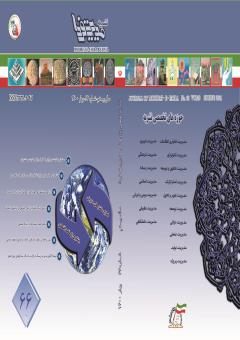Proposing a model of knowledge-based companies development, with emphasis on the role of the media
Subject Areas : مدیریت تحقیق و توسعهNader Godini 1 , Mehrdad Matani 2 * , Ali Falah 3 , Assadollah Mehrara 4
1 - PhD student, Department of Media Management, Qaimshahr Branch, Islamic Azad University, Qaimshahr, Iran.
2 - Assistant Professor of Media Management Department, Ghaem Shahr Branch, Islamic Azad University, Ghaem Shahr, Iran
3 - Assistant Professor, Department of Media Management, Noor Branch, Islamic Azad University, Noor, Iran
4 - Assistant Professor, Department of Public Administration, Qaimshahr Branch, Islamic Azad University, Qaimshahr, Iran
Keywords: Development, Knowledge-Based Companies, Media, Grounded Theory, Model,
Abstract :
The development of knowledge-based companies are necessary for the economic growth of the country. But there are many theoretical weaknesses in the development of these companies, especially in their conceptual models. The purpose of this study is the modification of the conceptual model to improve the development path of these companies. A systematic conceptual model for the development of companies, with considering the strategic role of the media, is the purpose of this paper. Firstly, the definitions, indicators, dimensions of knowledge-based companies, and the previous efforts related to them are discussed. The type of research is qualitative and is analyzed based on Grounded Theory methodology. The conceptual model is based on field observation and systematic interviews with 21 managers related to the development of knowledge-based companies, science and technology parks, and growth centers in Iran. The results show that the development of knowledge-based companies is due to the strategic role of media, which is included education, culture, information, and guidance. According to the development strategy of a knowledge-based company, the consequence of the process is enhanced by television and internet. On the other hand, the process is affected by base conditions such as culture, supervision, economics, media activities, as well as environmental conditions such as the academic capacity, websites, intellectual property, laws, sponsorship, Internet, industry, and politics. Trans nationalization of products, reduction of dependence, improvement of product quality, policy, decision making, strategy development, promotion of activities, employment growth, are the consequences of media's role in the development of knowledge-based companies.
اشتراوس، انس لم. کر بین، جولیات(1391) مبانی پژوهش کیفی (فنون و مراحل تولید نظریه زمینهای)، نشر نی، تهران.
اکبر زاده، نجمه. شفیعزاده، احسان،(1391). «بررسی نقش دولت درروند ایجاد و توسعه کسبوکارهای دانشبنیان»، فصلنامه رشد فناوری، شماره33، ص53-46.
اللهیاری فرد، نجف. عباسی، رسول،(1390)، «بررسی الگوی مناسب ساختار سازمانی شرکتهای دانشبنیان»، فصلنامه رشد فناوری، شماره 29، ص54-47.
امانی تهران، محمد. احمد امینی، زهرا،(1390)، «تحلیل افقهای شرکتهای دانشبنیان دانشگاهی و راهکارهای پیشگیران»ه، نشریه علمی ترویجی مطالعات در دنیای رنگ، شماره 1، ص24-19.
سامها ین، هانس(1386) مدیریت فناوری در سازمانهای فناوری بنیان، رسا، تهران، ص 78- 60
سروری ششلیکی، زهرا(1391) «ارائه مدل مفهومی از شرکتهای دانشبنیان، اجلاس ملی کارآفرینی و مدیریت کسبوکارهای دانشبنیان»، دانشگاه مازندران، مازندران.
سید میرزایی، سید محمد(1381) جمعیتشناسی عمومی، انتشارات دانشگاه شهید بهشتی، تهران.
صمدی، سعید. کلاهدوزان، امین. اسفندیاری، مریم.(1387)، «خوشههای فناوری و کارکردهای آن در ایجاد جریان تجارت فناوری در کشور»، فصلنامه رشد فناوری، شماره 14(۴)،ص33-27.
طالبی، کامبیز. زارع یکتا، محمدرضا.(1387). «آموزش کارآفرینی دانشگاهی و نقش آن در ایجاد و توسعه شرکتهای کوچک و متوسط دانشبنیان»، مجله توسعه کارآفرینی، شماره 1، ص131-111.
عظیمی، حسین(1393) مدارهای توسعهنیافتگی در اقتصاد ایران، نشر نی، تهران، چاپ پانزدهم.
عماد زاده، مصطفي. شهنازي، روحالله. دهقان شباني، زهرا.(۱۳۸۵)، «بررسي ميزان تحقق اقتصاد دانشمحور در ايران (مقايسه تطبيقي با سه كشور همسايه)»، فصلنامه پژوهشهاي اقتصادي، سال ششم، شماره ۲۰.
عماد زاده، مصطفي. شهنازي، روحالله. (۱۳۸۶)، «بررسي مباني و شاخصهاي اقتصادي دانشمحور و جايگاه آن در كشورهاي منتخب در مقايسه با ايران»، فصلنامه پژوهشنامه اقتصادي سال هفتم شماره ۱۴(۲۷).
فخاری، حسین. سلمانی،داود (1392) رهبری در مهندسی، «رویکردی جهت بهبود مدیریت شرکتهای نوپای دانشبنیان، فصلنامه تخصصی پارکها و مراکز رشد»، سال 9، شماره 35 ، ص۱-۲۰.
فخاری، حسین. سلیمانی، داوود. دارایی، محمدرضا، (1392) «بررسی اثرات تحریمهای اقتصادی بر عملکرد شرکتهای دانشبنیان کشور»، فصلنامه سیاست علم و فناوری، دوره 5 شماره 3.
فراست خواه، مقصود(1388) «آیندهاندیشی درباره کیفیت آموزش عالی، مدلی برآمده از نظریه مبنایی»، فصلنامه پژوهش و برنامهریزی در آموزش عالی. دوره ۱۴، شماره ۴(۵۰).
فرزین مقدم، اکبر. کریم لو، رضا (1394)، «معرفی ستاد اقتصاد دانشبنیان و کمیتههای آن»، منطقه ويژه علم و فناوری ربع رشیدی، تبریز.
قاسمي. حسين، (1390). آشنايي با شركتهاي تعاوني دانشبنیان، اجلاس ملي كارآفريني، تعاون، جهاد اقتصادي، دانشگاه آزاد اسلامي واحد نائین، نائین.
قرهباغیان، مرتضی( 1393)، اقتصاد، رشد و توسعه. نشر نی، تهران، چاپ سیزدهم.
مهدی زاده، سید محمد(1383) یادداشت. فصلنامه رسانه، معاونت امور مطبوعاتی و اطلاعرسانی وزارت فرهنگ و ارشاد اسلامی، شماره 58.
مهدی زاده، سید محمد، (1389)؛ نظریههای رسانه: اندیشههای رایج و دیدگاههای انتقادی، نشر همشهری، تهران، چاپ اول.
میرزایی، خلیل(1388) پژوهش، پژوهشگری و پژوهشنامه نویسی. جامعه شناسان، تهران.
Gorman, G. G., & McCarthy, S. (2006). Business development support and knowledge-based businesses. The Journal of Technology Transfer, 31(1), 131-143.
Kumar, V. (2000). International marketing research (pp. 225-226). Upper Saddle River, NJ: Prentice Hall Shane, S. (2000). Prior knowledge and the discovery of entrepreneurial opportunities. Organization science, 11(4), 448-469 Shankar, R., Gupta, A., & Narain, R. (2003). Strategic planning for knowledge management implementation in engineering firms. Work study. 52(4), 190 -200
Straus, A., & Corbin, J. (1990). Basics of qualitative research: Grounded theory procedures and techniques. 101-121 Sveiby, K. E. (2001). A knowledge‐based theory of the firm to guide in strategy formulation. Journal of intellectual capital. 2(4), 344-358

